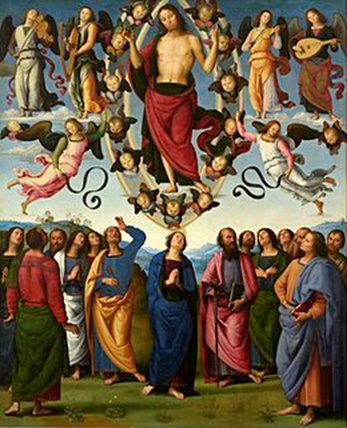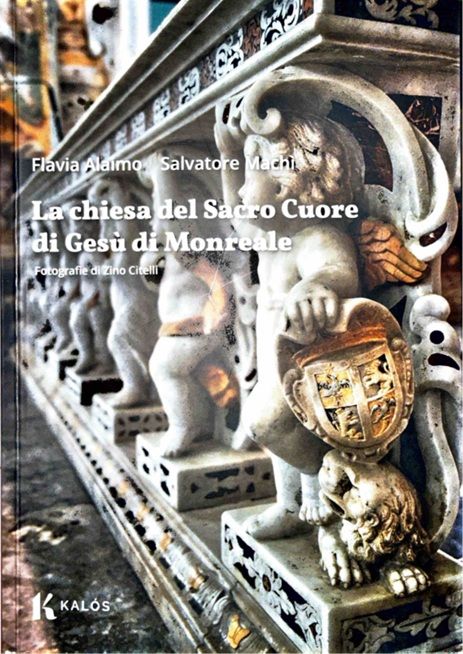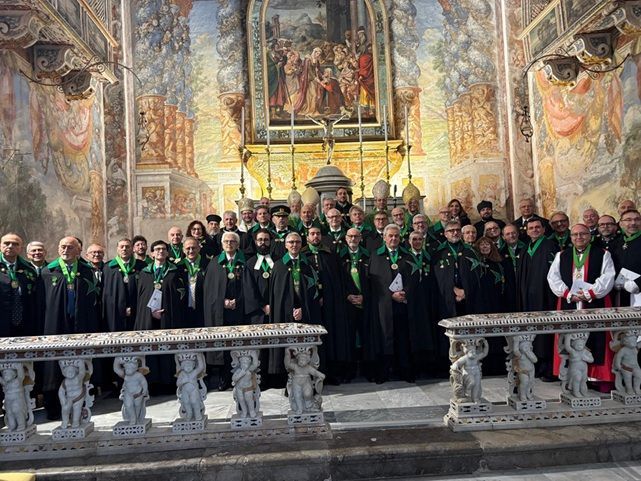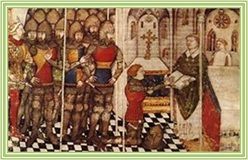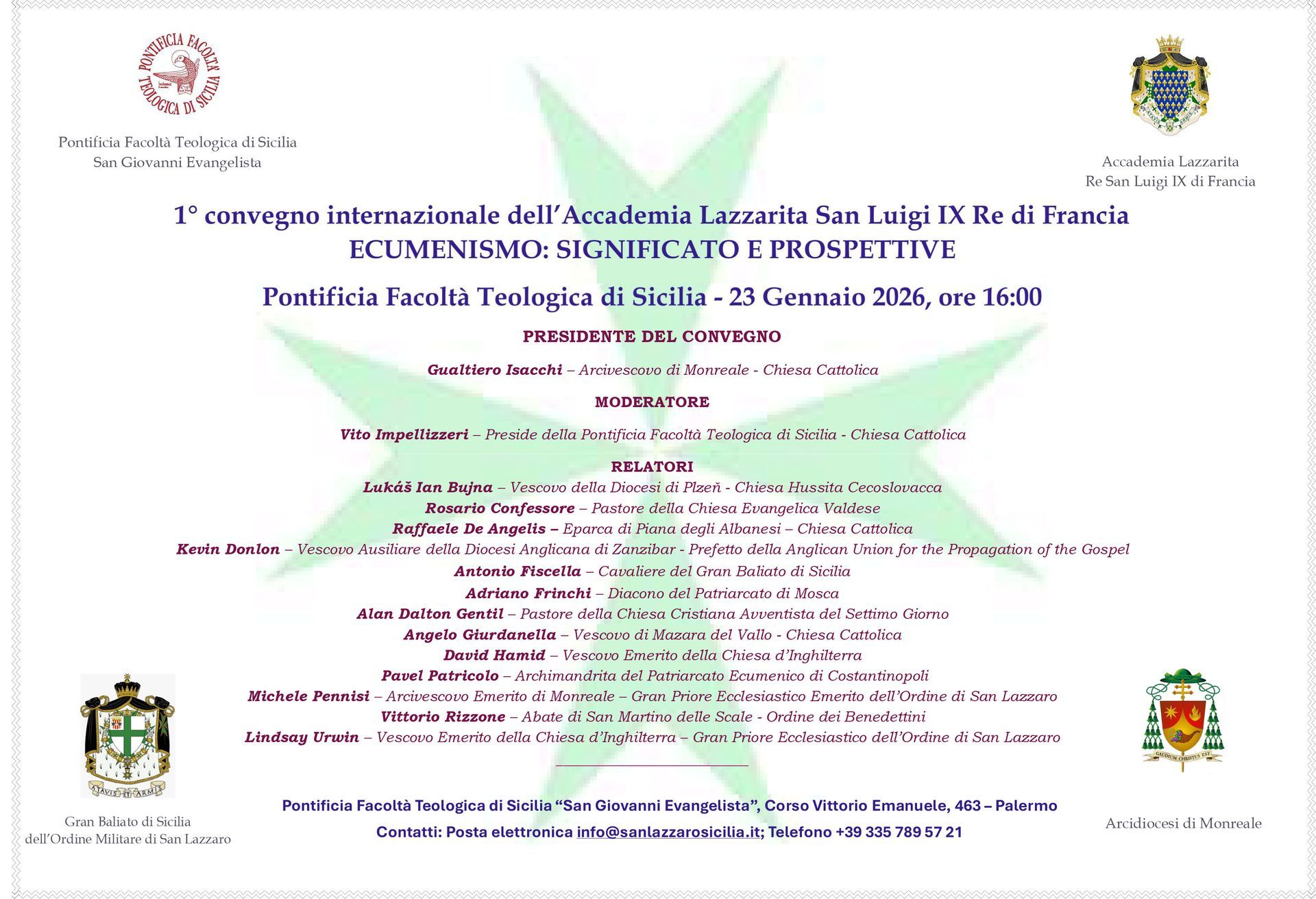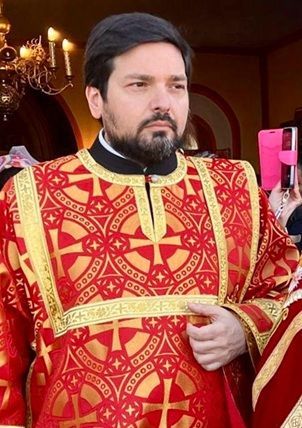RIFLESSIONE SU PASQUA, ASCENSIONE E PENTECOSTE DI SUA GRAZIA ROALD NIKOLAI FLEMESTAD VESCOVO ORDINARIO DELLA NORDIC CATHOLIC CHURCH GRAN CROCE ECCLESIASTICA DELL’ORDINE DI SAN LAZZARO DI GERUSALEMME
RIFLESSIONE SU PASQUA, ASCENSIONE E PENTECOSTE
DI SUA GRAZIA ROALD NIKOLAI FLEMESTAD
VESCOVO ORDINARIO DELLA NORDIC CATHOLIC CHURCH
GRAN CROCE ECCLESIASTICA DELL’ORDINE
DI SAN LAZZARO DI GERUSALEMME
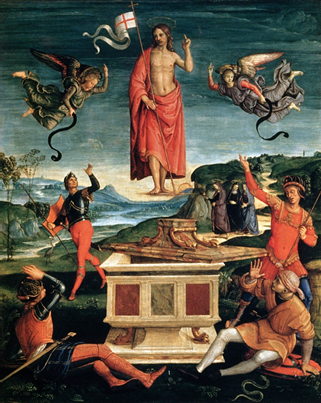
(Resurrezione di Cristo, Raffaello Sanzio, 1499 - 1502, São Paulo Museum of Art, São Paulo)
Carissimi confratelli e Consorelle dell’Ordine Militare e Ospedaliero di San Lazzaro di Gerusalemme,
Quando San Pietro il giorno di Pentecoste spiega agli ebrei che Cristo è il Messia, riassume gli eventi salvifici affermando: "Questo Gesù Dio l'ha risuscitato, e di questo noi tutti siamo testimoni. Essendo dunque esaltato alla destra di Dio e avendo ricevuto dal Padre la promessa dello Spirito Santo, egli ha effuso questo, che voi stessi vedete e sentite" (Atti 2,32s). In questa citazione che è forse la più antica testimonianza della predicazione nella chiesa primitiva, Pietro presenta paradossalmente l'effusione dello Spirito come una conseguenza dell'intronizzazione di Cristo, che segue alla sua morte e risurrezione. Questa connessione interna tra Pasqua, Ascensione e Pentecoste è mantenuta in modo simile da San Paolo in un inno che egli cita nella sua Lettera ai Filippesi:
Cristo si è fatto obbediente fino alla morte
- fino alla morte di croce.
Perciò Dio lo ha anche altamente esaltato
e gli ha dato il nome
che è al di sopra di ogni nome,
affinché al nome di Gesù
ogni ginocchio si pieghi,
in cielo, in terra e sotto terra,
e ogni lingua confessi
che Gesù Cristo è il Signore,
a gloria di Dio Padre. (2:8-11)
Spiegando il significato della morte di Cristo sulla croce in questo modo, la chiesa primitiva non solo ci presenta Cristo come risorto dalla tomba, ma anche come asceso al cielo seduto come Signore alla destra di Dio Padre. Così, la proclamazione della regalità di Cristo ci porta un passo oltre il racconto della Pasqua. Esaltato da Dio Padre, Cristo è il Signore, intronizzato nella gloria.
La regalità di Cristo
In realtà, questa immagine è presa dal rituale di corte orientale. Nelle occasioni solenni il principe ereditario gode della posizione privilegiata di sedere accanto al monarca. La Chiesa primitiva aveva familiarità con questo tipo di linguaggio, dai salmi reali nell'Antico Testamento:
Il Signore disse al mio Signore, siedi alla mia destra,
finché non avrò fatto dei tuoi nemici lo sgabello dei tuoi piedi,
il Signore manderà da Sion la verga della tua forza.
Regna in mezzo ai tuoi nemici! (Sal. 110, cfr. Sal. 2)
In effetti, Gesù stesso aveva citato questo salmo per esprimere il suo status di Messia. Inoltre, in tempi di difficoltà, la chiesa primitiva traeva conforto dalla potenza di Cristo alla destra del Padre (Eb 1,3ss).
Lotta spirituale
Tuttavia, l'intronizzazione del Signore nella gloria non significa che tutto sia ora tranquillo. Durante il suo pellegrinaggio nel tempo, fino al ritorno di Cristo nella gloria, la Chiesa militante è confrontata con nemici spirituali che fanno guerra ai santi perché "osservano i comandamenti di Dio e hanno la testimonianza di Gesù Cristo" (Ap 12:17, 14:12). In questo modo il criterio della persecuzione è la fedeltà. Con nomi apocalittici presi dall'Antico Testamento, questi nemici della fede sono caratterizzati metaforicamente come animali aggressivi come il Serpente, il Drago e la Bestia (Apoc. 2:17; 13:15). Inoltre, tutte le potenze che negano o si rivoltano contro la Signoria di Cristo sono riassunte nelle lettere di San Giovanni come Anticristo, il bugiardo ingannatore (2 Giovanni 2:7, cfr. Giovanni 8:44). Astutamente, l'Anticristo cerca di attirare i credenti lontano dalla fede istituendo una falsa religione, mentre allo stesso tempo usa anche il mondo dell'incredulità come strumento per la sua rabbia contro i cristiani.
La secolarizzazione interna delle chiese
Allo stesso modo, San Paolo mette in guardia i Corinzi dal "dio di questo tempo (che) ha accecato le menti degli increduli, così che essi non possono vedere la luce del vangelo che manifesta la gloria di Cristo, che è l'immagine di Dio". Questa cecità spirituale può essere guarita solo proclamando "Gesù come Signore", conclude (2 Cor 4,4s). Inoltre, nella sua lettera ai Tessalonicesi l'Apostolo indica la minaccia che viene dall'interno della chiesa, mettendo in guardia i fedeli dal "mistero dell'iniquità che è all'opera nel tempio di Dio". "L'impenitente" causerà un allontanamento generale da Cristo Signore (2 Tess 2:3ff).
Oggi, il pericolo della cecità spirituale rimane come una reale minaccia alla fede. Riducendo l'orizzonte del vivere nel mondo a "me, qui e ora", la cultura postmoderna può imprimerci l'idea che lo scopo della vita sia semplicemente io e la mia felicità. Questo egocentrismo è intrinsecamente ateo e distrugge il cristianesimo dall'interno. Non c'è nessuna creazione data da Dio, nessun legame comune tra gli uomini, nessun Vangelo da proclamare per la salvezza dell'umanità perché la fede è diventata una disposizione interiore privata. Di conseguenza, la religione serve solo ad uno scopo terapeutico - la sensazione di benessere personale. Poiché ognuno di noi è il proprio padrone in una società post-verità, solo l'esperienza privata può autenticare la mia fede. La "fede" è praticata come un patchwork privato di nozioni e sentimenti ironicamente caratterizzato come "google buddhism".
Il dilemma liberale e l'autoritarismo risvegliato
Il problema dell'autorità in una società senza coerenza sociale è diventato un problema palpabile nell'attuale cultura secolare. Se nella nostra società multiculturale sorgono conflitti sociali, si ritiene che sia compito dello Stato fungere da arbitro, bilanciando i diritti e i doveri tra diversi gruppi sociali e interessi alternativi, per garantire che non ci siano limitazioni al diritto dell'individuo all'auto-realizzazione. Il dilemma liberale è allora come imporre giudizi senza diventare di parte a favore della parte vincente.
Tuttavia, all'indomani del postmodernismo non c'è nessun modello dato nella vita umana, nessuna forza orientata all'obiettivo o standard comune unificato che possa servire da terreno neutrale. In questo vuoto non ci sono standard comuni vincolanti per pensare e agire. L'uguaglianza dei diritti ha portato all'intuizione di George Orwell nella Fattoria degli animali: "Tutti gli animali sono uguali, ma alcuni sono più uguali degli altri". Alla fine le direzioni normative si basano sul potere autoritario di imporre la correttezza politica. Oggi, l'autoritarismo malato sta prendendo sempre più il controllo della società attraverso il soggettivismo militante. In una società post-verità la definizione di verità è: "Agisci come ti viene detto - o ti portiamo in tribunale". L'abuso del potere legale minaccia le cosiddette "minoranze cognitive".
Rivendicazioni fattuali
In questa guerra culturale la sfida per la comprensione cristiana della verità è essenzialmente connessa alle affermazioni fattuali: "Se Cristo non è risorto", spiega San Paolo ai Corinzi che basavano la loro fede su esperienze private, "la vostra fede è inutile, siete ancora nei vostri peccati" (1 Cor 1 5,17). La narrazione evangelica conduce ad un modello di dottrina come sostiene l'Apostolo nella sua Lettera ai Romani: "Se confesserete con le vostre labbra che Gesù è il Signore e crederete nel vostro cuore che Dio lo ha risuscitato dai morti, sarete salvati" (Rm 10,9s, cfr. 1 Cor 8,6. ). Questa confessione della Signoria di Cristo avviene nell'atto del battesimo e nella potenza dello Spirito Santo: "Nessuno può dire che Gesù è il Signore se non per mezzo dello Spirito Santo" (12,3, cfr. 8,6).
La Chiesa come comunità di fede
Nonostante l'importanza personale che questa confessione ha per la vita dell'individuo, la professione di fede non lo conduce in una relazione privata con Gesù. Al contrario, la conversione e la confessione di fede pone il nuovo nato nella comunità di coloro che credono in Cristo come Signore: "Perché quanti di voi sono stati battezzati in Cristo si sono rivestiti di Cristo. Non c'è più giudeo né greco, non c'è più schiavo né libero, non c'è più maschio e femmina; perché tutti voi siete uno in Cristo Gesù" (Gal 2,27s). Così, la fede cristiana invita l'individuo a trovare la sua identità nelle relazioni, legandosi ad altri che condividono la stessa fede in Cristo. Senza alcuna base in una narrazione vincolante, il Vangelo si trasforma in immagini mistiche e nozioni vaghe, giustificate dalla loro utilità terapeutica o politica. Non c'è posto per la fede della Chiesa come professata nei Credo. Per la maggior parte dei cristiani moderni è inconcepibile che la fede cristiana sia l'unica via di salvezza. Il cristianesimo così presentato è concettualmente fallimentare.
Servire Cristo nella gioia e nella pace
Lo scopo della fede cristiana è di crescere in santità e di farlo in una comunità. Entrambi gli scopi si realizzano nello Spirito Santo dato alla Chiesa il giorno di Pentecoste. Questa presenza dello Spirito viene a noi oggi come un'anticipazione del Regno di Dio che è "giustizia, pace e gioia nello Spirito Santo" (Rm 14,17). Lo Spirito Santo è il fondamento della Chiesa come tempio santo e allo stesso tempo la fonte della ricchezza e della gioia tra i fedeli. Lo Spirito, il Paraclito, ci chiama all'impegno e all'attenzione di tutto il cuore verso il Signore. In questo modo il ruolo dello Spirito è quello di portarci ad accettare e comprendere la nuova realtà che ci è stata data nella risurrezione di Cristo. La mia fedeltà come membro della Chiesa in questi tempi difficili è di rispondere a Gesù che "mi ha amato e ha dato se stesso per me" (Gal 2,20). Perché in lui siamo benedetti e abilitati a servire nella giustizia e nella pace nello Spirito Santo (Rm 14,17s). Quindi viviamo e camminiamo nello Spirito in modo da poter raccogliere "il frutto dello Spirito" - amore, gioia, pace e fedeltà (Gal 5,23s).
✠ Roald Nicolai Flemestad, EGCLJ, Vescovo Ordinario della NCC
Meditation ON EASTER, ASCENSION AND PENTECOST
BY HIS GRACE ROALD NIKOLAI FLEMESTAD
ORDINARY BISHOP OF NORDIC CATHOLIC CHURCH
GRAND ECCLESIASTICAL CROSS OF THE ORDER
OF SAINT LAZARUS OF JERUSALEM
(Ascension of Christ, Pietro Perugino, 1496 - 1500, Musée des Beaux-Arts, Lyon.)
Dear brothers and sisters of the Military and Hospitaller Order of St Lazarus of Jerusalem,
When St. Peter on Pentecost Day explains to the Jews that Christ is the Messiah, he sums up the salvific events by stating: “This Jesus God raised up, and of that all of us are witnesses. Being therefore exalted at the right hand of God, and having received from the Father the promise of the Holy Spirit, he has poured out this, which you yourselves are seeing and hearing” (Acts 2:32f). In this quotation which is perhaps the earliest testimony of the preaching in the primitive church, Peter paradoxically presents the outpouring of the Spirit as a consequence of the enthronement of Christ, which follows from His death and resurrection. This inner connection between Easter, Ascension and Pentecost is similarly maintained by St. Paul in a hymn which he quotes in his Letter to the Philippians:
Christ became obedient to the point of death
— even death on a cross.
Therefore God also highly exalted him
and gave him the name
that is above every name,
so that at the name of Jesus
every knee should bend,
in heaven and on earth and under the earth,
and every tongue should confess
that Jesus Christ is Lord,
to the glory of God the Father. (2:8-11)
Explaining the meaning of Christ’s death on the cross in this way, the primitive church not only presents Christ to us as resurrected from the tomb but also as ascended to heaven sitting as the Lord at the right hand of God the Father. Thus, the proclamation of the Kingship of Christ takes us one step further than the Easter story. Exalted by God the Father, Christ is the Lord, enthroned in Glory.
The Kingship of Christ
In fact, this imagery is taken from Oriental Court ritual. On solemn occasions the Crown Prince enjoys the privileged position of sitting next to the Monarch. The early church was familiar with this kind of language, from royal psalms in The Old Testament:
The Lord said to my Lord, sit at my right hand,
till I make your enemies your foot-stool,
the Lord shall send the rod of your strength out of Zion.
Rule in the midst of your enemies! (Ps. 110, cf. Ps. 2)
As a matter of fact, Jesus had himself quoted from this psalm in order to express his status as the Messiah. Moreover, in times of trouble the early church took comfort from Christ’s power at the right hand of the Father (Heb 1:3ff).
Spiritual struggle
Still, the Lord’s enthronement in glory does not mean that all is now peaceful. During her pilgrimage in time, until Christ’s return in Glory, the Church Militant is confronted attacked by spiritual enemies making war against the saints because they “keep the commandments of God and have the testimony of Jesus Christ” (Rev 12:17, 14:12). In this way the criterion for persecution is faithfulness. With apocalyptic names taken from the Old Testament these foes of the faith are metaphorically characterised as aggressive animals like the Snake, the Dragon and the Beast (Rev. 2:17; 13:15). Moreover, all the powers who deny or revolt against the Lordship of Christ are summed up in the letters of St. John as Antichrist, the deceiving Liar (2 John. 2:7, cf. John 8:44). Cunningly, the Antichrist tries to lure the believers away from the faith by instituting a false religion while at the same time also using the world of unbelief as an instrument for his rage against the Christians.
The inner secularisation of the churches
In the same manner, St. Paul cautions the Corinthians of “the god of this age (who) has blinded the minds of unbelievers, so that they cannot see the light of the gospel that displays the glory of Christ, who is the image of God”. This spiritual blindness can only be healed by proclaiming “Jesus as Lord”, he concludes (2 Cor 4:4f). Furthermore, in his letter to the Thessalonians the Apostle points to the threat coming from inside the church, warning the faithful of “the mystery of lawlessness which is at work in the temple of God”. “The lawless one” will cause a general falling away from Christ the Lord (2 Thess 2:3ff).
Today, the danger of spiritual blindness remains as a real threat to the faith. By reducing the horizon of living in the world to “me, here and now”, the postmodern culture may impress upon us the idea that the purpose of life is simply me and my happiness. This egocentricity is inherently atheistic destroying Christianity from within. There is no God given creation, no common bonds between men, no Gospel to proclaim for mankind’s salvation as the faith has become a private inner disposition. Accordingly, religion serves only a therapeutic purpose – the feeling of personal well-being. As each one of us is our own master in a post-truth society, only private experience can authenticate my faith. “Faith” is practised as a private patchwork of notions and feelings ironically characterised as “google buddhism”.
The liberal dilemma and woke authoritarianism
The problem of authority in a society without social coherence has become a palpable problem in the present secular culture. If social conflicts arise in our multicultural society it is seen as the task of the State to function as umpire balancing the rights and obligations between diverse social groups and alternative interests to ensure that there are no constraints on the individual’s right to self-fulfillment. The liberal dilemma is then how to impose judgements without becoming partisan in favour of the winning part.
However, in the aftermath of postmodernism there is no pattern given in human life, no goal oriented force or unified common standard which can serve as neutral ground. In this vacuum there are no binding common standard for thinking and acting. Equal rights have led to George Orwell’s insight in Animal Farm: “All animals are equal but some are more equal than others”. In the end normative directions are based on the authoritarian power to impose political correctness. Today woke authoritarianism is taking more and more control of society by means of militant subjectivism. In a post-truth society the definition of truth is: “Act as you are told – or we take you to court.” The misuse of legal power threatens so-called “cognitive minorities”.
Factual claims
In this cultural war the challenge for the Christian understanding of truth is essentially connected with factual claims: “If Christ is not risen”, St. Paul explains to the Corinthians who based their faith on private experiences, “your faith is futile, you are still in your sins” (1 Cor 1 5:17). The Gospel narrative leads into a pattern of doctrine as the Apostle maintains in his Letter to the Romans: “If you confess with your lips that Jesus is Lord and believe in your heart that God raised him from the dead, you will be saved” (Rom.10:9f, cf 1 Cor 8:6. ). This confession of the Lordship of Christ takes place in the act of baptism and in power of the Holy Spirit: “No one can say that Jesus is Lord except by the Holy Spirit” (12:3, cf. 8:6).
The Church as a community of faith
Despite the personal importance this confession has for the individual’s life, the profession of faith does not lead him or her into private relationship with Jesus. On the contrary, the conversion and the confession of faith places the new born in the community of those who believe in Christ as the Lord: “For as many of you as were baptised into Christ have clothed yourselves with Christ. There is no longer Jew or Greek, there is no longer slave or free, there is no longer male and female; for all of you are one in Christ Jesus” (Gal. 2:27f). Thus, the Christian faith invites the individual to find his or her identity in relationships, by bonding with others who share the same faith in Christ. Without any basis in a binding narrative, the Gospel is transformed into mystical images and vague notions, justified by their therapeutic or political usefulness. There is no place for the faith of the Church as professed in the Creeds. For most modern Christians it is inconceivable that Christian faith should be the only way of salvation. Christianity thus presented is conceptually bankrupt.
Serving Christ in joy and peace
The purpose of Christian faith is to grow in holiness and to do so in a community. Both goals are fulfilled in the Holy Spirit given to the Church on the Day of Pentecost. This presence of the Spirit comes to us today as an anticipation of the Kingdom of God which is “righteousness, peace and joy in the Holy Spirit” (Rom 14:17). The Holy Spirit is the foundation of the Church as a holy temple and at the same time the source of richness and joy among the faithful. The Spirit, the Paraclete, calls us to wholehearted commitment and attentiveness to the Lord. In this way the role of the Spirit is to bring us to accept and comprehend the new reality given to us in the Resurrection of Christ. My fidelity as a member of the Church in these difficult times is to respond to Jesus who “loved me and gave himself for me” (Gal 2:20). For in him we are blessed and empowered to serve in righteousness and peace in the Holy Spirit (Rom 14:17f). So let us live and walk in the Spirit so that we can reap “the fruit of the Spirit” – love, joy and peace and faithfulness (Gal 5:23f).
✠ Roald Nicolai Flemestad, EGCLJ, Ordinary Bishop of the NCC

